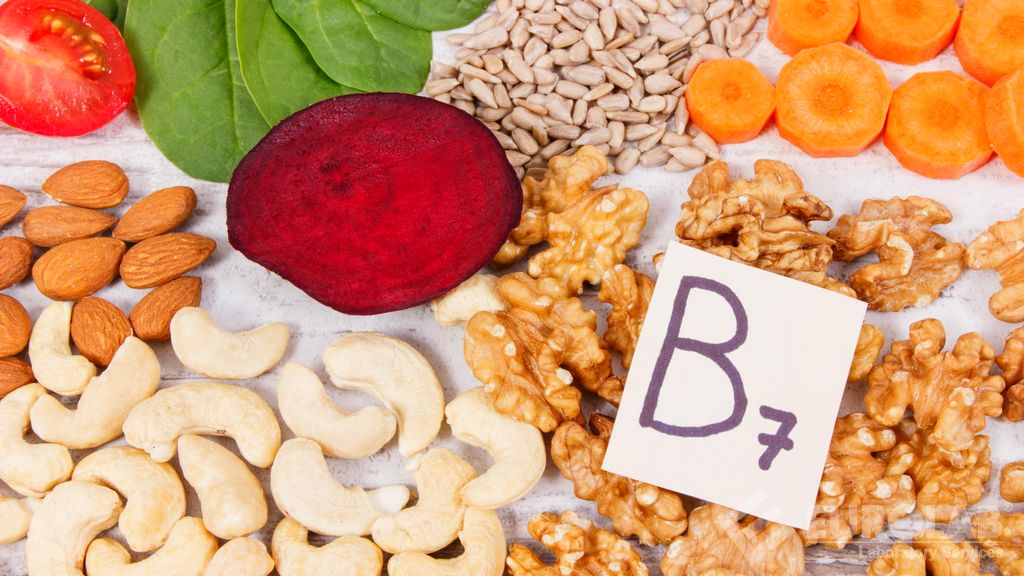Introduction
Vitamin B7, more commonly known as biotin, is a water-soluble B vitamin that plays a vital role in maintaining overall health and well-being. Often associated with its benefits for hair, skin, and nails, biotin has a broader range of functions within the body. This comprehensive guide explores the diverse benefits of biotin, its dietary sources, recommended daily intake, and its significance in various aspects of health, including skin and hair health, metabolism, and pregnancy.
Understanding Biotin (Vitamin B7)
Biotin is a member of the B-complex group of vitamins, known for their role in energy metabolism and overall health. It is a water-soluble vitamin, which means that the body does not store excess biotin, making regular dietary intake essential. Biotin is involved in various enzymatic reactions in the body, where it acts as a coenzyme, supporting essential metabolic processes.
Skin Health
Biotin is often associated with promoting healthy skin. It plays a crucial role in maintaining the integrity of the skin, supporting its barrier function, and helping to protect against environmental factors that can lead to skin issues. Biotin may help reduce the risk of skin conditions such as acne and eczema.
Furthermore, biotin is important for the production of fatty acids, which are essential for keeping the skin moisturized and healthy. Biotin deficiency can lead to dry, itchy skin and rashes.
Hair Health
Biotin is renowned for its positive effects on hair health. It plays a significant role in maintaining strong and healthy hair. Biotin supports the keratin structure in hair, making it less prone to breakage and damage. While biotin supplements are often marketed for their potential to promote hair growth, they are most effective in cases of biotin deficiency. For individuals with a deficiency, biotin supplementation can lead to improved hair quality and reduced hair loss.
Nail Health
Biotin’s benefits extend to nail health as well. It strengthens the keratin structure in nails, reducing their susceptibility to brittleness and breakage. Biotin supplements are often recommended for individuals with brittle nails or those who experience frequent nail splitting. Adequate biotin intake can result in healthier and more robust nails.
Metabolism and Energy Production
Biotin is a coenzyme involved in the metabolism of carbohydrates, fats, and proteins. It helps convert these macronutrients into energy that the body can use. Biotin plays a key role in the citric acid cycle, a series of chemical reactions that produce adenosine triphosphate (ATP), the primary energy currency of the body.
In this metabolic process, biotin assists enzymes in breaking down macronutrients, which are then used to fuel cellular functions. Biotin is crucial for maintaining energy levels and overall metabolic efficiency.
Blood Sugar Regulation
Biotin may aid in the regulation of blood sugar levels. It influences the metabolism of glucose and helps insulin, the hormone responsible for regulating blood sugar, function more effectively. Some studies suggest that biotin supplementation can help improve blood sugar control in individuals with type 2 diabetes or those at risk of the condition.
Pregnancy and Fetal Development
Biotin is essential during pregnancy as it supports the normal growth and development of the fetus. It plays a role in the formation of the baby’s major organs, and a deficiency can result in birth defects. Pregnant women are often advised to ensure they have sufficient biotin intake to support the healthy development of their baby.
Cognitive Function
While the relationship between biotin and cognitive function is not as well-established as some other vitamins, there is evidence to suggest that biotin may have a role in maintaining cognitive health. Biotin supports brain function through its involvement in energy metabolism, helping to ensure the brain receives the energy it needs for optimal performance. Additionally, biotin may play a role in reducing inflammation, a factor associated with cognitive decline.
Muscle Function
Biotin is necessary for proper muscle function. It plays a role in energy metabolism, providing the muscles with the necessary energy to contract and perform their various functions. Biotin deficiency can lead to muscle weakness and fatigue, affecting both physical performance and daily activities.
Sources of Biotin
Biotin is widely available in a variety of foods. Some excellent dietary sources of biotin include:
- Eggs: Egg yolks are a rich source of biotin.
- Nuts and Seeds: Almonds, walnuts, and sunflower seeds contain biotin.
- Meat: Meat, particularly organ meats like liver, contains biotin.
- Dairy Products: Milk, cheese, and yogurt provide biotin.
- Fish: Salmon, sardines, and trout are sources of biotin.
- Legumes: Beans, lentils, and peanuts contain biotin.
- Whole Grains: Whole grains like oats and wheat are biotin-rich foods.
- Fruits and Vegetables: Many fruits and vegetables, such as bananas, avocados, and sweet potatoes, contain biotin.
Recommended Daily Intake
The recommended daily intake of biotin varies by age, sex, and life stage. However, it is generally recommended that adults aim to get approximately 30 micrograms (mcg) of biotin per day. Keep in mind that individual requirements may vary based on factors such as age, sex, and overall health. It’s always a good practice to consult with a healthcare professional to determine your specific dietary needs.
Assessing Biotin Levels
Determining your biotin levels can be challenging, as biotin deficiency is relatively rare and difficult to diagnose accurately. There are no standard tests for assessing biotin status. Biotin supplements can interfere with certain blood tests, leading to false results. Therefore, it is crucial to inform your healthcare provider if you are taking biotin supplements, as this information is essential for accurate test interpretation.
Risks of Deficiency
While biotin deficiency is relatively rare, it can lead to a range of health issues, including:
- Hair and Skin Issues: Biotin deficiency can result in hair loss, brittle nails, and skin problems such as rashes.
- Neurological Symptoms: Severe biotin deficiency may lead to neurological symptoms, including depression, lethargy, and hallucinations.
- Impaired Growth and Development: In children, biotin deficiency can lead to developmental delays and growth issues.
Risks of Excess Intake
Biotin is generally considered safe, even at high doses. It is a water-soluble vitamin, meaning that any excess is excreted in the urine. Therefore, the risk of toxicity is very low. However, some individuals may experience mild gastrointestinal symptoms, such as nausea, cramping, or diarrhea, when taking high doses of biotin supplements.
Conclusion
Biotin, also known as vitamin B7, is a versatile and vital nutrient with a broad range of benefits for health, from skin and hair health to metabolism and cognitive function. It is crucial for maintaining energy levels, promoting healthy hair and nails, and supporting overall well-being.
To experience the benefits of biotin, it is essential to include biotin-rich foods in your diet, such as eggs, nuts, and dairy products. Understanding the significance of biotin and ensuring you meet your individual dietary needs can contribute to improved skin and hair health, energy metabolism, and overall vitality.
While biotin deficiency is relatively rare, the positive effects of biotin supplementation are most pronounced in cases of deficiency. Always consult with a healthcare professional to determine your specific biotin needs and to address any underlying health issues. Biotin is an essential element that can enhance your journey to optimal health and well-being.
- Craftsman Series from Vessel: Stylish Vape Pens for Every Preference - July 12, 2024
- Is It Sanitary to Reuse Bath Towels? What You Need to Know - June 11, 2024
- Bar Salts: Elevating Your Vaping Experience with Sophisticated Flavor Infusions - February 26, 2024

